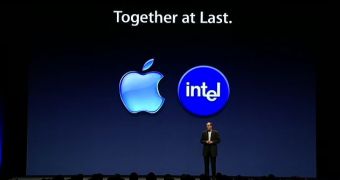Because of reported delays in chip development at Intel, rumors broke out last year that Apple might finally be ready to ditch its partnership with the Santa Clara foundry. But according to the chipmaker’s CFO, nothing could be farther from the truth.
At the 2005 Worldwide Developers Conference, Steve Jobs made a historic announcement confirming that Apple would ditch PowerPC and start using Intel chips in its Macs. Then, much like today, Intel supplied chips for most of Apple’s rivals.
Custom silicon
Apple doesn’t make a secret out of its preference for custom chips. Every iPhone, iPad, and iPod touch shipped since 2010 uses an SoC (system on a chip) designed by Apple on an ARM architecture. It uses Samsung and Taiwan Semiconductor Manufacturing Company (TSMC) as manufacturing partners, but otherwise the chip is theirs.
Currently at its fifth generation, the A-series chip designed by Apple jumps one version number each year, and spawns an incrementally-upgraded version just as often to support the bigger iPad. Apple usually designates this faster version with an X moniker. It is this particular version of the processor that, beginning this year, has become fast enough to theoretically support entry-level computers like the MacBook Air.
Intel: we lead the industry with our chips
In an interview with Business Insider, Intel CFO dismissed such rumors saying that Apple would be crazy to cease its partnership with the foundry. The reason is simple: Intel still leads the industry in processing power, and for Apple to abandon its chips, it would make Macs slower than other competing solutions out there.
"Apple is a great partner of ours," Smith said. "Like Intel they like bringing really cool stuff to the market [...] As long as we're bringing great technology to the marketplace, we're enabling them to do great Apple products."
Smith said Intel's leadership is continually extending, and that any delays reported by the media were "not delayed relative to the industry."
"We're actually ahead of the industry," he added, dismissing rumors that the foundry is somehow behind schedule with its next-gen processors.
He then noted that Apple would "have to take a big step off performance to step off our architecture," which is what gives Intel the edge, and therefore the confidence that the duo's business together is not in any danger.
Maybe just the MacBook Air
Smith undoubtedly speaks the truth, but that doesn’t mean Apple cannot experiment with A-series processors in computers like the MacBook Air, for example.
There is already a lot of evidence that the Cupertino giant is preparing a 12-inch version of the ultra-slim notebook, one that could potentially run on a custom-made A8X or A9 chip. Custom silicon offers numerous advantages to Apple, including better power management, better cooling, better performance, and the ability to roll out new products at its own volition.
While Apple is indeed dependent on Intel chips for its desktop computers, as well as the Pro series of MacBooks, nothing can stop it from taking a small plunge with the entry-level MacBook Air and see where it leads.

 14 DAY TRIAL //
14 DAY TRIAL //